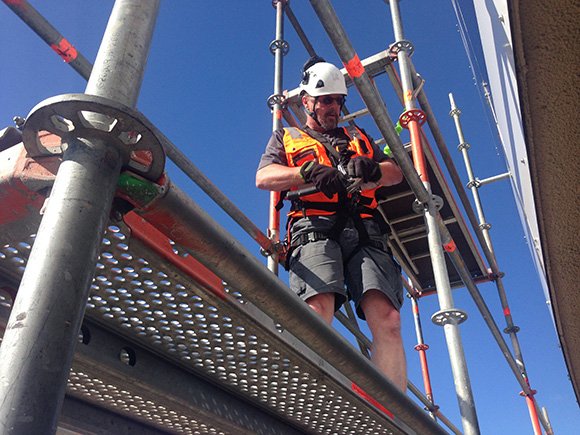
Working in Summer
Summer is a great time for getting work done on a construction site, but it does bring some extra safety risks.
Overview
Summer is a great time for getting work done on a construction site, but it does bring some extra safety risks.
Here are a few simple steps to staying safe when working in summer.
Reduce sun exposure
- Avoid long periods of work in direct midday sunshine.
- Take regular breaks in the shade.
- Wear UPF50+-rated lightweight long pants and long-sleeved shirts in lighter colours with adequate air flow or ventilation to help keep your temperature down.
- Use a hard hat with a front brim.
- If the back of your neck is exposed to the sun for long periods, use a neck flap or a combination full brim with a neck flap.
- Wear close-fitting, wrap-around sunglasses and ensure the AS/NZ 1337 standard is on the glasses.
Wear sunscreen
- Choose a broad-spectrum, water-resistant sunscreen of at least SPF30.
- Ensure the AS/NZ 2604 standard is on the label.
- Apply at least 15 minutes before going outside.
- Reapply at least every two hours.
Keep hydrated
- Drink plenty of water regularly throughout the day to stay hydrated.
- Keep a water bottle nearby and drink before you are thirsty.
- Drink 150 to 200ml of water every 15 to 20 minutes, rather than consume a 1-litre drink now and again.
- Most people need about eight glasses of water per day, but if you’re working in all-day heat, you will likely need more.
- Drinking water is preferable to drinking coffee, tea and energy drinks.
- You can still enjoy the odd tea or coffee as they are only mildly diuretic. However, energy drinks contain large amounts of caffeine (and sugar) which can have more extreme diuretic effects which can lead to dehydration.
Warning signs
Make sure you know the danger signs to look out for when working in the heat. If you do overheat, you’ll notice symptoms like:
- Feeling weak or dizzy
- Darker coloured urine
- Pounding or rapid pulse
- Loss of balance, fainting
- Headaches
- Muscle cramps
- Mood changes or confusion
- Clammy or sweaty skin
If heat stress or exhaustion is not dealt with quickly, it can progress to heat stroke. At its worst, this can be life-threatening.
Be extra careful when doing these types of work that makes you more likely to suffer heat exhaustion:
- Working in confined spaces
- Doing underfloor, ceiling or roof work
- In cabs of mobile plant
- Closed areas with limited air flow
It’s important to always protect yourself from the effects of heat by wearing sunscreen, drinking plenty of water, taking breaks and seeking shade.